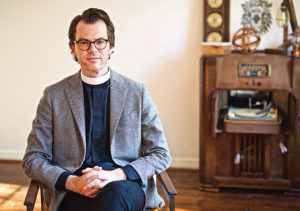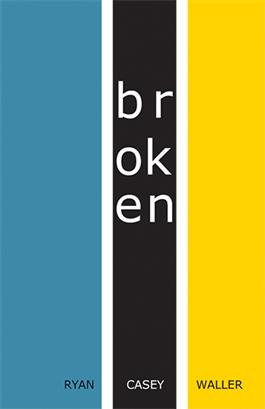 “We are all broken and in need of God’s blessing. No one has it all together.” –Ryan Casey Waller, Broken
“We are all broken and in need of God’s blessing. No one has it all together.” –Ryan Casey Waller, Broken
Last week, we ran Part 1 of Miriam McKenney’s recent interview with Broken author Ryan Casey Waller. (If you haven’t read it yet, you can do so here.)
Today, we hear more about Ryan’s process and inspirations, along with his larger goals for both the book and his new ministry as a priest.
Was there a story to essay that was harder to write than others?
The very first essay, “help”, was really difficult for me. I was fortunate to have an idyllic childhood. My family is really close, and I’m still very close to my parents. About eight years ago, some things happened, and relationships were blown up – and they have not been healed. My ordination to the priesthood a few weeks ago was only the second time in eight years that my family of origin has come together. People looked to us as pillars in a small community, so for me to speak openly about the pain of what happened was hard. I didn’t like writing that, but felt like I needed to because it’s part of my story. So many people that I minister to have these broken family relationships, and it’s horribly painful. Its’ challenged me to question whether I really believe that God actually makes all things new, because I profess that God does, and I believe that God does. Yet as I sit here in this moment, I have trouble seeing how that’s going to happen. So to choose to continue to believe that is hard.
Who or what do you read that inspires you? Are there writers you would recommend to others?
I’m an eclectic reader, and I like all sorts of genres. Barbra Brown Taylor inspired me on my journey to The Episcopal Church. The poet Mary Oliver’s work is like magic. Her poetry is so powerful and honest. I also enjoy Irvin Yalom, who is the most brilliant psychiatrist that ever existed. He’s an existentialist, and he doesn’t believe in God, but he asks all the right questions. He goes to the essence of what it is to be alive. I don’t agree with him on fundamental things but I go back to him often. One of my favorite fiction writers is Pat Conroy for his lyricism. He can both write and weave a plot.
What’s your ultimate goal for Broken, and for your ministry?
What I hope to do with Broken is to lift the stigma on mental health, and bridge the gap between the church and the mental health community. Next month, we’re having a night of prayer here for mental health awareness week. Along with prayer, we will have four mental health professionals speak. I feel very much called to help remove this stigma and to think very seriously about how the church gets people the help they need. It’s an issue that hasn’t really been fully thought through and implemented. The church catches a lot of people, and that’s our job. If a person has a mental health issue, the first two people they’re most likely to tell are their primary health physician and their clergy person, which is good, because these are the people they trust. Sometimes the doctor doesn’t know exactly what to do, and sometimes the priest thinks they can do the counseling.
I want to challenge mental health professionals to work with me to bring these two communities together. Let’s figure out the system, so that people don’t fall through the cracks. I think we’re a little afraid of each other. The church thinks mental health professionals are two science-y, or secular. There’s bias from psychotherapists, where they think they know what we’re about, what we believe; that we’re anti-science. There’s so much misunderstanding between the two communities, and we need each other. That is a part of entering into these spaces of vulnerability and honesty to do the work that needs to be done for God’s people.
Talking about mental health is something that I feel called to, and I share in the book about my own period of having panic attacks. I found a great deal of healing when I began to see a therapist. It took me several years before I could share that with anyone. Being able to admit that has allowed me to have such deeper, meaningful relationships with parishioners. They come to me knowing I have no judgment; I’ve been through it. It’s often difficult to understand for anyone who isn’t going through a mental health issue, like depression or anxiety; it’s extraordinary painful. I feel called to speak into that and be open about those wounds in hopes that it might heal some others.
Interested in reading Broken? You can order your copy here.
And for further reading around mental health, you might find these resources helpful:
https://www.nami.org/Get-Involved/Awareness-Events/Mental-Illness-Awareness-Week




